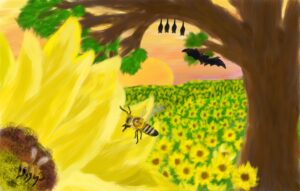Every member of an eco-system, from vegetation to predator species, plays an integral role in the sustainability of that system. When one player is removed from the hierarchy, whether by result of climate change, pollution, human development, or natural occurrences, the effects are cascading. An often overlooked and yet essential vulnerable group of species is pollinators. Although bees and fruit bats are not the poster children for endangered species like tigers and elephants, their role in pollination facilitates an ecological process critical for the reproduction of wild flora and agricultural crops.

According to the U.S. Department of Agriculture, more than 150 crop species in the United States, including blueberries, tomatoes, apples, bananas, and peaches, rely on pollinators annually. Alfalfa and other grain crops necessary to sustain livestock also rely upon pollination. Furthermore, more than half of the world’s diet of fats and oils are produced from animal-pollinated plants (sunflowers, almonds, canola, avocados). Honeybees alone are responsible for pollinating $15 billion in crops for the U.S. economy each year (Main, 2020). Plainly speaking, without pollinators, the globe’s future food security collapses.
Without pollinators, you can drop the dinner table conversation because there quite literally won’t be a dinner
So, where does the issue reside? According to Penn State University’s Center for Pollinator Research, since 2006, the honeybee population in the United States has declined 30-42 percent each year largely due to the impacts of climate change, habitat loss, and toxic pesticide use. Of the 65 species of flying foxes (fruit bats), 31 are threatened with global extinction (Vincenot, 2017). Protecting species of pollinators is not just the “right thing” to do; it’s compulsory for human existence.
As managers of sustainable and responsible investment portfolios, our passion lies not only in providing ethically sourced returns for our clients, but in supporting positive impact-driven organizations. Conscious investing is achieved through avoidance of institutions that harm ecosystems, in conjunction with focus on institutions that provide regenerative and resourceful solutions. [artwork (c) 2020 P. Sorgi]
Read more:
Center for Pollinator Research (Penn State University). 2020. Globally, Pollinators Are In Decline. [online] Available at: https://ento.psu.edu/pollinators/resources-and-outreach/globally-pollinators-are-in-decline#:~:text=In%20the%20US%2C%20beekeepers%20have,not%20been%20as%20closely%20tracked..
Fs.fed.us. 2020. Why Is Pollination Important?. [online] Available at: <https://www.fs.fed.us/wildflowers/pollinators/importance.shtml> [Accessed 9 July 2020].
Main, D., 2020. Bumblebees Are Going Extinct In A Time Of ‘Climate Chaos’. [online] National Geographic. Available at: <https://www.nationalgeographic.com/animals/2020/02/bumblebees-going-extinct-climate-change-pesticides/> [Accessed 9 July 2020].
Vincenot, C., Florens, F. and Kingston, T., 2017. Can we protect island flying foxes?. Science, 355(6332), pp.1368-1370.
